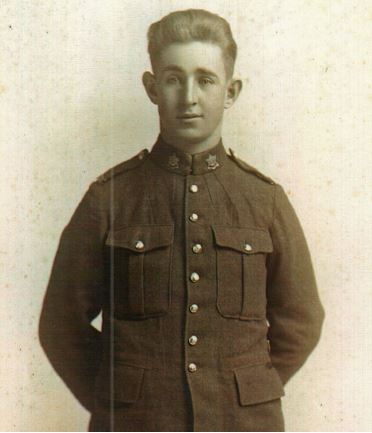Pte
Peter Pegg
Informationen zu Geburt
|
Geburtsdatum: 01/06/1897 |
|
Geburtsort: Blenheim, Ontario, Canada |
Allgemeine Informationen
|
Beruf: Landwirt / Bauman / Ökonom |
Informationen zum Armeedienst
|
Land: Canada |
|
Truppe: Canadian Expeditionary Force |
|
Rang: Private |
|
Dienstnummer: 189868 |
|
Einberufung datum: 17/01/1916 |
|
Einberufung ort: St. Thomas, Ontario, Canada |
|
Einheiten: — Canadian Infantry, 18th Bn. (Western Ontario) (Letzte bekannte Einheit) |
Informationen zu Tod
|
Sterbedatum: 19/11/1917 |
|
Sterbeort: German Lazaret in Izegem, Belgien |
|
Todesursache: Verwundet |
|
Alter: 20 |
Begräbnisplatz
|
Tyne Cot Cemetery Grabstelle: LIX Reihe: C Grab: 12 |
Auszeichnungen und Orden 2
|
British War Medal Medaille |
|
Victory Medal Medaille |
Punkte von Interesse 2
| #1 | Geburtsort | ||
| #2 | Einberufung ort |
Meine Geschichte
Private Peter Pegg, a former farmer from Ontario, served in the 18th Battalion Canadian Infantry (Western Ontario), which was part of the 4th Canadian Brigade, 2nd Canadian Division.
Between the 9th and the 12th of November, the 18th Battalion was holding a line on the eastern outskirts of Passchendaele village (28.D.12.b.45.90. to 28.D.6.b.65.35). On the 12th Private Pegg was wounded in the shoulder. His commander sent him to a Field Dressing Station behind the front. Since no reports about him were received after this, he was listed as ‘missing in action’ and later ‘missing presumed dead’.
In early 1918 German documents sent to the Canadian Army stated that Private Peter Pegg had died of wounds on the 19th of November 1917 in a German Advanced Dressing Station (Lazaret) in Izegem. After the war his grave was moved from the Communal Cemetery in Izegem (21.S.21.b.6.2) where he was originally buried to Tyne Cot Cemetery.
By the end of 1917 all landmarks near the village of Passchendaele had been wiped out by shell fire. The War Diary notes that rainy weather, mud and waterlogged shell holes made movement difficult. It’s likely that Private Pegg had become lost in the bare landscape and walked to the German lines in error.
Between the 9th and the 12th of November, the 18th Battalion was holding a line on the eastern outskirts of Passchendaele village (28.D.12.b.45.90. to 28.D.6.b.65.35). On the 12th Private Pegg was wounded in the shoulder. His commander sent him to a Field Dressing Station behind the front. Since no reports about him were received after this, he was listed as ‘missing in action’ and later ‘missing presumed dead’.
In early 1918 German documents sent to the Canadian Army stated that Private Peter Pegg had died of wounds on the 19th of November 1917 in a German Advanced Dressing Station (Lazaret) in Izegem. After the war his grave was moved from the Communal Cemetery in Izegem (21.S.21.b.6.2) where he was originally buried to Tyne Cot Cemetery.
By the end of 1917 all landmarks near the village of Passchendaele had been wiped out by shell fire. The War Diary notes that rainy weather, mud and waterlogged shell holes made movement difficult. It’s likely that Private Pegg had become lost in the bare landscape and walked to the German lines in error.
Quellen 5
|
Ancestry https://www.ancestry.com/ Verwendete Quellen |
|
CWGC https://www.cwgc.org/find-war-dead/casualty/464256/pegg,-/ Verwendete Quellen |
|
Library and Archives Canada http://www.bac-lac.gc.ca/eng/Pages/home.aspx Verwendete Quellen |
|
Service Record http://www.bac-lac.gc.ca/eng/discover/military-heritage/first-world-war/personnel-records/Pages/list.aspx?SurnameSearch=Pegg&GivenNameSearch=Peter& Verwendete Quellen |
|
The Long Long Trail http://www.longlongtrail.co.uk/army/order-of-battle-of-divisions/ Verwendete Quellen |
